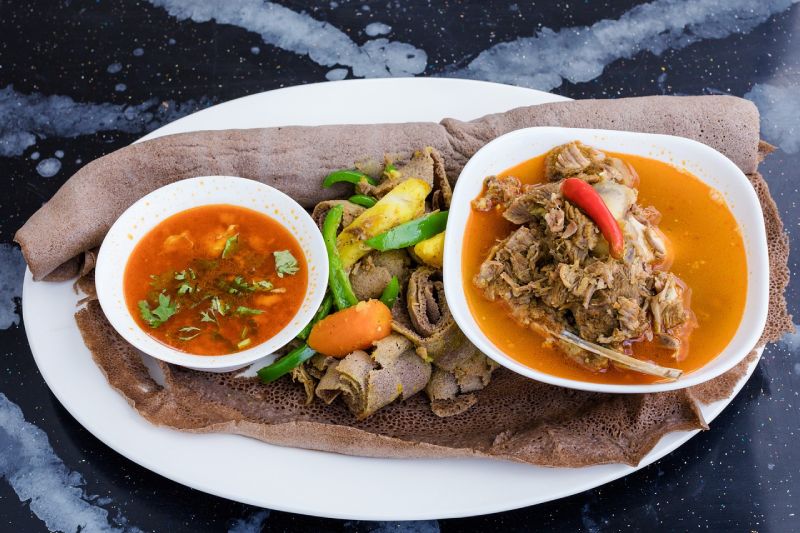Food
Top Pizza Toppings of the World: What You Shouldn’t Miss

There are only some food items that are as popular and widespread as a pizza. While the standard flatbrad delicacy hails from Naples, Italy, it is safe to assume that almost every nation has its own unique version of pizzas to try out. For instance, in India, you can try out unique flavours available at Dominos to magnify your experience.
One of the easiest ways to bring about variations to any pizza flavour is by changing the toppings. Thankfully, leading pizza chains like Dominos, come forth with an array of delicious pizza toppings to make your day. Let us discuss the same.
Best Pizza Topings for Your Delicious Meal
Pizza enthusiasts might consider sticking to the standard cheese or pepperoni pizza flavours. However, there are different pizza toppings you must try out. While it all comes down to personal taste preferences, if you wish to spruce up your pizza game, you should know about the different pizza toppings you should have.
Broccoli
Broccoli, on its own, is a delicious vegetable. However, when you use this veggie as a pizza topping, it only magnifies in the overall flavour. There is nothing redeemable about using broccoli as a pizza topping. It might taste quite bland, the texture might be odd, and it could be soggy sometimes. However, when toasted to perfection, broccoli on your pizza tastes divine.
Pepperoni
There can be no pizza more iconic than the all-time famous pepperoni pizza. Around the globe, the salty pork topping has garnered itself quite a reputation as a leading pizza topping.
Pepperoni is a sought-after pizza topping due to specific reasons. For one, it is quite salty, delicious, and spicy to boost your experience. Secondly, the ingredient bakes to perfection on the pizza slice, indulging effortlessly with the molten cheese top. To top it all, this pizza profile appears appealing from all angles.
Pineapple
While it is quite debatable, stil pineapple serves to be one of the popular choices for pizza toppings. It is one of the few sweet options available out there. As you order a classic cheese pizza, it is going to be salty, rich, or savoury. However, it is never going to be sweet.
This is where the mildly sweet and juicy flavours of pineapple toppings come into play. Delivering just the perfect blend of sweetness and acidity, pineapples on top of your pizza are a match made in heaven.
Jalapenos
When compared with bell peppers, jalapenos are rich when it comes to the overall flavour profile. The splendid beauty of jalapenos, particularly when associated with a pizza, lies in the fact that you can relish freshly-sliced or even picked peppers in this case. Both flavours are immensely delicious.
Fresh jalapenos go ahead with offering ample heat and brightness to any pizza. On the other hand, jarred or pickled jalapenos will impart a softer bite. If you are fond of spices, you will love all variations of pizzas made with jalapeno toppings.
Black Olives
Amazingly buttery and super salty, black olives are one of the most sought-after canned ingredients you will find on most pizza toppings. The rich combination of black olives and cheese on a pizza top is definitely a winning one. Even those who might not be too fond of olives will still fall behind the rich flavour profile.
Black olives also serve to be amazing textural toppings. These ingredients blend perfectly with cheese and do not become too mushy or soggy. To top it all, they taste great with other pizza toppings while tasting divine on their own as well.
Honey
Dropping honey on top of your pizza might appear something new, but it’s defintiely worth the hype. Whether you relish simple honey or you like hot honey, this secret ingredient delivers a highly welcoming sweetness to any pizza. At the same time, honey, as a pizza topping, also provides much relief from all the savouriness.
While honey turns out to be more of a garnishing or drizzle than a standalone ingredient, we still feel that it deserves a name in this list. Even with other delicious toppings on your pizza, honey will add mre beautiful complexity to your delicacy while doing away with the boring flavours.
Pickles
The mere thought of placing cucumber slices on your pizza might not excite that much. We do not recommend the same. However, what about pickles? Pickles definitely turn out to be a completely different story. We would indeed recommend loading your pie with these tangy, delicious slices.
Classic pickles impart a vinegary flavour that works heavenly with cheese. They also deliver the right amount of crunch. Pickles are a great pizza topping for different types of pies.
Onions
Ordering a Dominos pizza from Swiggy? Chances are you might be intrigued to order the pizza with the classic onion and cheese toppings as they are immensely delicious. Whether you choose diced or sliced onions as the pizza toppings, they bring about something welcoming to any pizza slice.
Onions tend to be versatile ingredients in almost all forms of cooking across all variants of cuisines. Therefore, it is no surprise that they make up for a great pizza topping. Moreover, you cannot go wrong with the type of onion you choose for your pizza – white, yellow, green, or red onions. Delivering just the right amount of sharpness, umami, and tanginess, onions complement a classic cheese pizza without overpowering its innate flavour.
Conclusion
The world of pizza toppings is as diverse as the cultures that have embraced it. From classic combinations like pepperoni and mushrooms, there’s a pizza topping out there to satisfy every palate. The best pizza topping is ultimately a matter of personal preference, as regional influences and culinary traditions have shaped unique and delicious pizza experiences around the globe.
Food
Innovations in African Cuisine

African cuisine is experiencing a vibrant renaissance, marked by a surge of interest in its diverse flavors, rich cultural heritage, and innovative approaches to traditional dishes. As the world becomes more interconnected, culinary enthusiasts are increasingly drawn to the unique and varied offerings from the African continent. This article delves into the innovations shaping African cuisine today, highlighting its potential to influence global dining trends and capture the palates of food lovers everywhere
African cuisine is not monolithic; it is a rich tapestry woven from a myriad of cultural influences, regional ingredients, and historical narratives. Each region boasts its own distinct flavors and cooking techniques, reflecting the continent’s vast geography and cultural heritage. This website proposes a wide range of games to try your luck.
Regional Flavor Profiles
- North Africa: Known for its aromatic spices and rich use of ingredients like lamb, seafood, and grains, North African cuisine often features dishes like tagines and couscous. The historical interactions with Mediterranean and Middle Eastern cultures have significantly shaped its culinary landscape.
- West Africa: This region is celebrated for its hearty dishes that prominently feature starches such as yam, cassava, and rice. Staples like jollof rice and fufu are often accompanied by flavorful stews, showcasing the use of vibrant spices and ingredients.
- East Africa: The culinary practices here vary between inland and coastal regions. Inland diets are typically meat-heavy, while coastal areas incorporate a variety of spices and seafood, with dishes like injera taking center stage in Ethiopian cuisine.
- Southern Africa: Often referred to as “rainbow cuisine,” Southern Africa blends indigenous cooking with European and Asian influences. Dishes like potjiekos and braai reflect the region’s complex cultural history.
Cultural Significance of Food
Food in Africa goes beyond simple nourishment; it plays a pivotal role in social gatherings, celebrations, and cultural identity. The preparation and sharing of meals are integral to communal practices, fostering strong bonds among family and friends. This article highlights how this cultural importance fuels the growing global interest in African cuisine, with many seeking authentic dining experiences that share a rich story.
The Influence of the African Diaspora
The African diaspora has played a pivotal role in shaping global cuisine, introducing ingredients, cooking techniques, and flavors that have become staples in many regions.
Culinary Cross-Pollination
Through centuries of trade and migration, African culinary traditions have mingled with those of other cultures, resulting in unique hybrid cuisines. For example, the Caribbean’s creole dishes and Southern soul food reflect a blend of African, indigenous, and European influences, showcasing how African flavors can be adapted and celebrated in diverse culinary contexts.
Celebrating Heritage Through Food
The resurgence of interest in African cuisine is also tied to a growing movement among chefs of African descent to celebrate their heritage. These culinary pioneers are not only preserving traditional recipes but are also reinterpreting them for modern palates, creating a dynamic dialogue between the past and present.
Culinary Innovations and Trends
The culinary landscape is constantly evolving, and African cuisine is no exception. Innovative chefs are pushing boundaries, experimenting with ingredients and techniques to create exciting new dishes.
Afro-Fusion Concepts
The rise of Afro-fusion restaurants is a testament to the growing popularity of African flavors. These establishments often blend traditional African dishes with global culinary influences, resulting in unique offerings that cater to adventurous eaters. For example, a West African-inspired taco might feature spicy jollof rice and grilled plantains, showcasing the versatility of African ingredients.
Health-Conscious Options
As more diners seek healthier options, African cuisine’s emphasis on whole foods and plant-based ingredients positions it well within this trend. Dishes that incorporate superfoods like fonio, a nutritious ancient grain, are gaining traction among health-conscious consumers looking for flavorful yet wholesome meals.
The Role of Technology in Culinary Innovation
Technology is revolutionizing the way we approach cooking and dining, and African cuisine is benefiting from these advancements.
Digital Platforms for Culinary Exploration
Social media and food blogs have become powerful platforms for sharing African culinary traditions and innovations. Chefs and home cooks alike are using these tools to showcase their creations, connect with a global audience, and inspire others to explore African flavors.
Online Cooking Classes and Resources
The rise of online cooking classes has made it easier for individuals to learn about African cuisine from the comfort of their homes. These classes often focus on traditional techniques and recipes, allowing participants to gain a deeper understanding of the cultural significance behind each dish.
Addressing Challenges in Ingredient Sourcing
Despite the growing interest in African cuisine, challenges remain in sourcing authentic ingredients, particularly for chefs and home cooks outside the continent.
Logistical Hurdles
Many African ingredients are not readily available in international markets, leading chefs to seek alternatives or adapt recipes. This challenge highlights the importance of building supply chains that can efficiently deliver authentic ingredients to global consumers.
Promoting Local Producers
Efforts to promote local African producers and farmers can help bridge the gap in ingredient sourcing. By supporting sustainable farming practices and fair trade initiatives, the culinary community can ensure that authentic African ingredients are accessible to those eager to explore this vibrant cuisine.
The Future of African Cuisine
As African cuisine continues to gain momentum on the global stage, its future looks bright.
Predictions for Growth
Industry experts predict that the popularity of African cuisine will continue to rise, with more restaurants featuring African-inspired dishes on their menus. This trend is particularly evident among younger consumers, who are eager to explore diverse culinary experiences.
Embracing Sustainability
Sustainability will play a key role in shaping the future of African cuisine. By prioritizing local, seasonal ingredients and sustainable practices, chefs can create dishes that not only taste good but also contribute positively to the environment.
Conclusion: A Culinary Journey Awaits
The innovations in African cuisine are not just about food; they represent a celebration of culture, history, and community. As more people discover the rich flavors and diverse offerings from the African continent, the culinary landscape will continue to evolve, creating exciting opportunities for chefs, diners, and food enthusiasts alike.
Food
The Many Benefits of Chai and Its Varieties

Chai, a beloved drink rooted in South Asian tradition, has become a global sensation. Beyond its comforting taste, chai offers numerous health benefits, making it more than just a simple beverage.

Health Benefits of Chai:
- Rich in Antioxidants:
The black tea used in chai is packed with antioxidants like catechins and theaflavins, which combat free radicals and reduce the risk of chronic diseases.
- Anti-Inflammatory Properties:
Ingredients like ginger and cinnamon are known for their anti-inflammatory properties, which can help reduce pain and swelling in the body.
- Improves Digestion:
Chai spices like ginger and cardamom aid in digestion, making it a perfect drink after meals.
- Boosts Immunity:
The combination of spices, especially clove and cardamom, can strengthen your immune system, helping you fight off infections.
- Enhances Heart Health:
The spices in chai, particularly cinnamon, help reduce blood pressure and cholesterol levels, promoting a healthier heart.
- Supports Weight Loss:
Chai, especially when consumed without added sugars, can boost metabolism and aid in weight loss due to its thermogenic properties.
Different Varieties of Chai:
- Masala Chai:
A traditional blend of black tea with spices like ginger, cardamom, cinnamon, and cloves. It’s robust, warming, and perfect for cold days.
- Ginger Chai:
Focuses on ginger as the primary spice, offering a strong, spicy flavor that is great for digestion and fighting colds.
- Cardamom Chai:
A lighter, aromatic version, where cardamom is the star, offering a refreshing and slightly sweet taste.
- Herbal Chai:
Often caffeine-free, this version replaces black tea with herbs like rooibos or peppermint, making it suitable for evening consumption.
- Kashmiri Chai:
Known for its beautiful pink color and rich, creamy texture, this chai is made with green tea, nuts, and spices, often served during special occasions.
- Iced Chai:
A modern twist, perfect for summer, where chai is served over ice, sometimes with a splash of milk or cream.
Incorporating Chai into Your Lifestyle:
Chai is not just a drink; it’s an experience. At Oh Chai!, the focus is on creating tea-time memories with freshly brewed chai and handcrafted delights. Whether you enjoy your chai hot or cold, spicy or sweet, the ritual of chai can bring comfort and warmth to any moment of your day. Visit Oh Chai to explore their range of chai and discover new ways to enjoy this timeless beverage.
-

 Entertainment11 months ago
Entertainment11 months agoBest Kickass Proxy List 2024 – 100% Working to Unblock to Access
-

 Lifestyle11 months ago
Lifestyle11 months agoBanging The Underdog Incident 2022
-

 Entertainment11 months ago
Entertainment11 months agoTamilMV Proxy Sites List 2025 – How to Unblock TamilMV Safely?
-

 Entertainment11 months ago
Entertainment11 months agoTamilRockers Proxy 2025: 20+ Working Links, Mirror Sites & VPN Guide
-

 Fashion9 months ago
Fashion9 months agoTrendy Midi Dresses for Casual Wear: Hair Care Tips Included!
-

 Entertainment11 months ago
Entertainment11 months agoPirate Bay Proxy List 2025: Access The Pirate Bay Safely
-

 Technology7 months ago
Technology7 months agoSSIS 469 – Detailed Guide to Understand The Features and Benefits
-

 Blog9 months ago
Blog9 months agoCy Kass – Family Detail of Alex Wagner and Sam Kass




